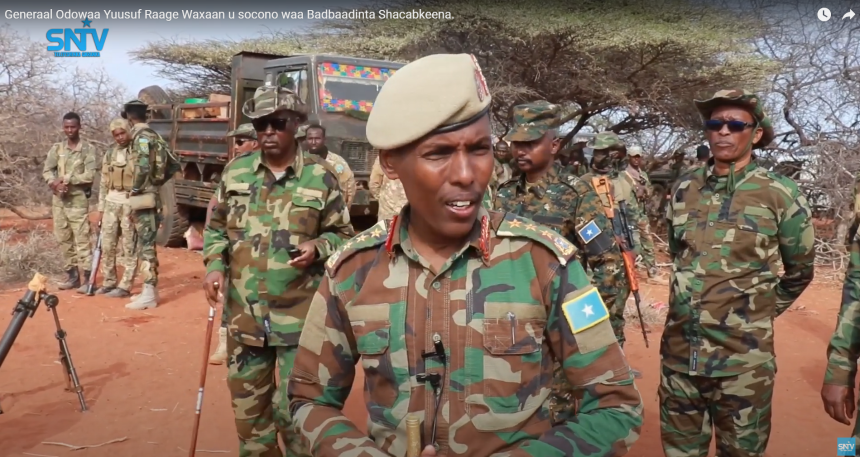Mogadishu, SONNA – The Somali National Army (SNA), supported by local forces and international partners, has conducted a series of heavy airstrikes in the Middle Shabelle region over the past two days. The strikes, which included both drone and warplane operations, have severely disrupted Al-Shabaab’s movements and operations in the area.
The airstrikes come in response to Al-Shabaab’s recent attempts to seize control of several areas in Middle Shabelle, following weeks of unrest and instability. The militant group, which typically operates in small groups and under the cover of darkness, has been unable to openly mobilize in large numbers as it had in previous days. This marks a notable shift in the dynamics of the conflict, as the use of warplanes in the strikes is the first such instance in a considerable period.
Coordinated Efforts to Combat Al-Shabaab
The Somali government, led by President Hassan Sheikh Mohamud, has established a special committee to oversee the counter-terrorism operations in Middle Shabelle. This committee, comprising government leaders, military officers, and local representatives, has been working tirelessly to apply pressure on Al-Shabaab and reclaim territories under militant control.
Honorable Mohamed Ibrahim Moalimu, a member of the Federal Parliament of Somalia, emphasized the importance of including representatives from the four villages in the area within the committee. “It would be good if the members of the committee included people from the four villages in the area,” he stated, highlighting the need for local involvement in the decision-making process.
Al-Shabaab’s Propaganda and Regional Threats
Despite the setbacks, Al-Shabaab has continued its propaganda efforts, with its leader, Ahmed Diiriye (Abu Ubeyda), releasing an audio message claiming significant progress in Central Shabelle. In the message, Abu Ubeyda portrayed himself as a leader poised to seize power through a coup, warning, “We are coming for you, so be patient.”
The militant group’s focus on propaganda underscores its attempts to maintain morale among its fighters and supporters, even as it faces mounting pressure from Somali forces.
Broad Political Support for the War Against Al-Shabaab
The fight against Al-Shabaab has garnered widespread support across Somalia’s political spectrum. Opposition leaders, including former President Sharif Sheikh Ahmed, presidential candidates Hassan Ali Kheyre and Abdirahman Abdi Shakur Warsame, have issued a joint statement expressing their full backing for the ongoing military operations. Former President Mohamed Abdullahi Farmaajo also released a detailed statement earlier, reaffirming his support for the government’s efforts.
Honorable Moalimu acknowledged the importance of political unity in the face of the terrorist threat. “I do not see any problem in having different political views or criticizing others, but it is important to underline that the opportunity the enemy will get will be inherited from a joint result of the people, the government, and the opposition,” he stated.
Strengthening Security Measures
In today’s Cabinet meeting, the Somali government issued several decisions aimed at bolstering national security. These included warnings against the spread of false propaganda and the imposition of severe penalties for actions that undermine national stability. Honorable Moalimu also called on the international community to refrain from disseminating discordant messages and to share official information with relevant security agencies.
“The confusion created by such information is more serious than what a thousand young people have written on social media,” he noted, urging international partners to adopt a more coordinated approach in their communications.
A Unified Front Against Terrorism
The recent airstrikes and counter-offensives in Middle Shabelle demonstrate the Somali government’s resolve to eliminate the threat posed by Al-Shabaab. With broad political support, local involvement, and international cooperation, Somalia is making significant strides in its fight against terrorism.





